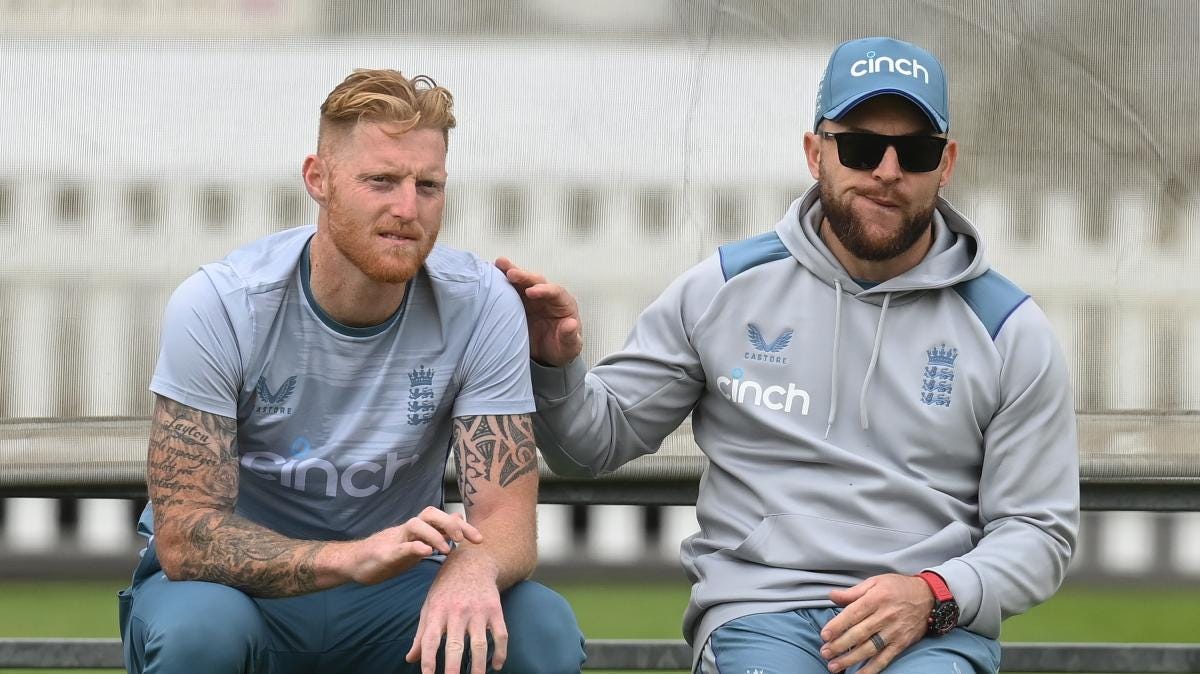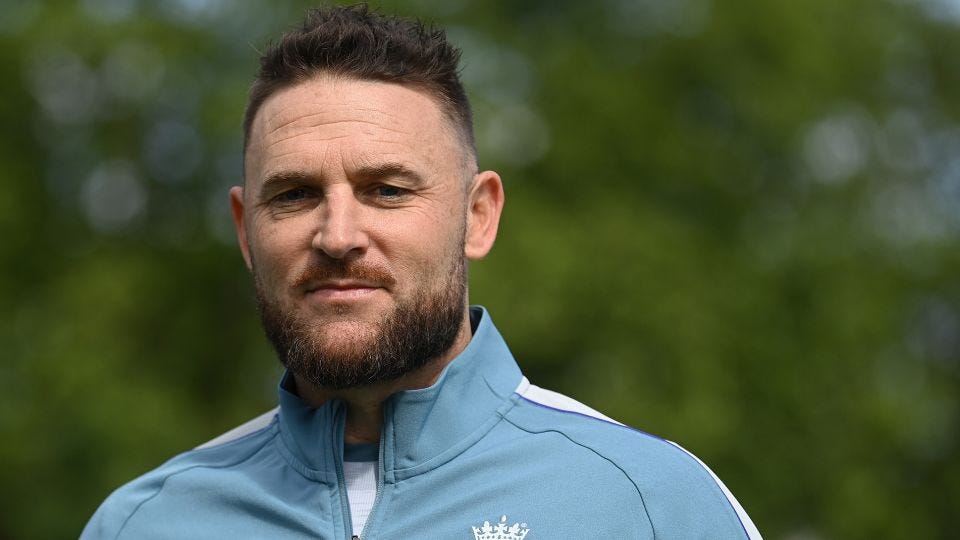McCullum's first test ...
Brendon McCullum has a considerable job ahead of him to revitalise this England men’s Test side. And, we believe his first task is balancing his own principles, with those of the team he is inheriting
It seems like an eternity ago, the first test of an away Ashes series. December 2021 - Brisbane, and the start of a wildly calamitous campaign. 177 days to be precise - and it’s difficult to apply any form of preciseness to what transpired in Australia.
Wednesday, December 8 - Pat Cummins, the newly installed Australian captain, must have thought all his Christmases had come at once. England’s team sheet read like the cast from one of Talbot Rothwell’s ‘Carry on movies’ - what followed was a cacophony of erroneous decisions to a point of laudable confusion and humiliation.
That day was lost, the test match soon after, and then the series. From an England perspective, one can only wish - ‘Out of despair comes hope’
England’s followers must hope this to be the case, and they should wish that the new decision-makers will show greater clarity and consistency. Their opposition, New Zealand, will present as a robust, combatant team. As they always do. Thanks in the main to one of England’s new employees - more on that later.
Thankfully, some, or most, of the previous decision-makers have been removed, and what was left of England’s gate-keepers have rightly ushered in new folk.
It is easy to like what Rob Key, Managing Director of the England Cricket team, is bringing to the table. He is using his honeymoon period wisely, looking clearly past the obvious, rightly challenging the status quo, and finally, allowing instincts to play a part in decision-making, something that has been errantly overlooked by his predecessor(s)
Ben Stokes, as Captain, offers up tangible optimism. England’s supporters will grant Stokes immunity from the normal captain-bashing criticism, he clearly has credits to spend.
Conjecture around the life-time of his appointment is erring on the shorter side; this will sit just fine with Stokes. He is a wonderful cricketer, and an even better teammate. His ascent to captaincy was a path he had no desire to chart, a positional change that looked as unlikely to him as a ‘dry fifth stump line.’
Anyhow - he is here now - the captain.
Stokes immediately navigated to the thorny issue of the side-lined veteran fast bowlers; James Anderson, and Stuart Broad, imploring management to bring them back into the fold. We shall see if he gets his want? Of course he will - good sense will prevail - 177 days on.
And then to the Coach …
First, interestingly (I will need to paraphrase) Rob Key is on print as saying “Coaches (cricket) fall into three categories: those that have a positive effect; those that have a negative, and those who have NO effect.”
It does seem Key’s most astute move to date has been the appointment of Brendon McCullum as England’s head coach. He will be wishing for category one, followed by category three. In my opinion, the art of coaching has many more layers than Key acknowledged in his book - Oi Key: Tales of a Journeyman Cricketer - just saying.
Why so astute? Well, there are many synergies that place McCullum in an optimistic space when evaluating his chances of him imparting that positive influence that is so badly required. In the absence of proper planning, initially, he will focus solely on the game in hand; in this case, New Zealand at Lords, test one of a three test series.
His first press conference was predictable. Traveling from New Zealand, he landed in London and presented in a relaxed manner. With little, or no time, to prepare, he emphasised the need to ‘instantly free up those players who have been immersed in the teams downward trend’ I see strong intimation that James Anderson and Stuart Broad will both play at Lords.
The predictability around the press conference was based on the questions asked, not the answers given. He speaks fluently, and clearly uses his own dictionary, a refreshing change to the norm of cliched rhetoric employed by previous leaders.
McCullum sees talent, he talks of allowing that talent to grow at a speed that is comfortable for the player. Alternatively, he sees the team’s growth being driven by the captain, and acknowledges this might be at a different speed to individual development. He will have to ‘plug holes where necessary’ Not driving change, more cajoling it in the right direction.
His square one will be ‘starting conversations’ - McCullum is a modern disciple of clear, and consistent communication. One leads into the other. He was only recently removed as a player from this practice. He is well versed.
He says: ‘he understands technique, but doesn’t coach it’ Preferring to concentrate on situational teaching. He values the importance of developing ‘decision-makers’ and passing over autonomy - eventually.
The McCullum CV shows very little coaching experience. I believe this to be an advantage. He will be up to speed quickly on the methods inherent to English cricket; not being a ‘career coach,’ will afford him opportunities to challenge these methods. I anticipate successful outcomes here.
He will ask for ‘players to be the best version of themselves’ not ‘a version of their coach’ or those who preceded them. Preferring they develop an identity unique to their own skill-set, and one that matches their role in the team.
Having said that … I will argue McCullum’s first real personal test will be successfully removing himself from his inner mind-set, the psyche that set him aside as a player, and leader, one that is acutely aligned to his current opposition. He was, and presumably still is, an intensely patriotic person.
The silver fern, New Zealand’s national symbol, is inked on him forevermore. And, so he doesn’t forget, are his cap numbers, these etched in roman numerals. Clearly, someone's insistence on inscribing such information is not to remove oneself from absentmindedness. but to display a feeling of identity that is indelibly linked to a sense of patriotism.
McCullum has inked a four-year deal; his transportation to England colours is absolutely the paradox that will define his early tenure. He need not delete his playing past, the permanent ink that links him to his heritage, but, his challenge will be finding his space within the confines of this more complex identity, that is - English cricket, and the ineffable mysteries of the England cricket team.
McCullum has said - “I am a very staunch Kiwi. I’m very proud of my heritage, very proud of my upbringing and what I’ve been able to achieve for my country. I’ve invested a lot of my life in trying to perform for New Zealand and I feel I left the camp in a better position than when I took it over.”
He has many friends, teammates, and players he has mentored in the opposing dressing-room.
Kane Williamson, New Zealand’s captain, and most prolific batsman, is intrinsically linked to McCullum. Williamson took over captaincy from McCullum, and, most importantly, he has continued the legacy left by his former teammate. Williamson has captained New Zealand 38 times - for 22 wins, eight losses, and eight draws. He is a beneficiary of McCullum’s architecture.
Most incoming coaches rely on a ‘trump-like’ statement, or pledge, primarily to trumpet the start to their tenancy. A strident call to follow their word.
McCullum, I believe, is a believer in his own principles. Principles harvested in environs a long way removed from St John’s Wood. His first test will be balancing what he knows, with what he is yet to discover. This will take time and thought, and he is well capable of figuring out this early conundrum.
There will be no shortage of Union Jacks on show this weekend, a stark reminder to him of where his superficial loyalties will need to concentrate.
And to finish, I think his most compelling words to date: “If you are going to change your entire life for something, it has got to be a pretty big challenge. Opportunities like this don’t come around too often, hence why I was prepared to change my life for it and take on the job.”
England supporters will wish him well. As do I.






